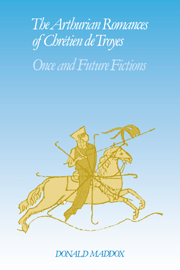Book contents
- Frontmatter
- Contents
- Acknowledgments
- List of abbreviations
- Introduction
- 1 Rex quondam: Arthurian tradition and the anterior order
- 2 Safely through the realm: customs in Le Chevalier de la charrete
- 3 Tenir terre: customs in Le Chevalier au lion
- 4 Rexque futurus: the anterior order in Le Conte du graal
- 5 Arthurian intertextuality: crisis and custom
- Conclusion: Literary customs and the socio-historical question
- Notes
- Bibliography
- Index
5 - Arthurian intertextuality: crisis and custom
Published online by Cambridge University Press: 07 October 2011
- Frontmatter
- Contents
- Acknowledgments
- List of abbreviations
- Introduction
- 1 Rex quondam: Arthurian tradition and the anterior order
- 2 Safely through the realm: customs in Le Chevalier de la charrete
- 3 Tenir terre: customs in Le Chevalier au lion
- 4 Rexque futurus: the anterior order in Le Conte du graal
- 5 Arthurian intertextuality: crisis and custom
- Conclusion: Literary customs and the socio-historical question
- Notes
- Bibliography
- Index
Summary
As conceived by Chrétien de Troyes, the Arthurian romance unveils a world ill regulated by its customs, chronically prone to crisis, and repeatedly destabilized in the absence of effective upholders of its institutions. The foregoing chapters have frequently emphasized ways in which crisis and custom are criteria indispensable for investigating the significance of each of the five works considered as an individual entity. If the inquiry were to cease at this juncture, however, it would fail to weigh the much larger implications of these explorations, because, as we have seen, there is considerable evidence which suggests that each romance, in addition to conveying its own meaning, may also signify as part of a transtextual coherence. A change of perspective will now enable us to measure the importance of crisis and custom to the establishment of that coherence within the œuvre as a whole, so that we may view Chrétien's “Arthuriad” as a multitextual totality, one which, as will be emphasized in the Conclusion, owes its literary and socio-cultural uniqueness to his reconceptualization of Arthurian narrative as a powerful vehicle of medieval legal fictions.
THE INTERTEXTUALITY OF CRISIS
Chrétien's romances normally partake of a pattern identified in Chapter 1 (pp. 15 ff.) as a textuality of crisis. The eponymous hero or couple characteristically develops within a linear format in which crisis organizes two structurally and thematically related series of episodes, one building the conflict that activates the crisis, the other tracing a compensatory movement initiated by disclosures occurring within the crisis.
- Type
- Chapter
- Information
- The Arthurian Romances of Chrétien de TroyesOnce and Future Fictions, pp. 119 - 132Publisher: Cambridge University PressPrint publication year: 1991



